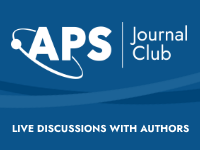| Volume 95, Issue 3 (partial) July - September 2023 | | Advertisement | APS has launched two new webinar series. The new Activating Industry Careers series will feature Dr. Peter S. Fisk with "Show Me the Money! Compensation in the Physics Industry" on September 19. The PULSE series for undergraduate students will launch with "Possible Research Areas" on September 27. Register now. | | | | | Advertisement | Abstract submissions are officially open for the APS March Meeting 2024! Showcase your work to a global audience of physicists, scientists, and students representing 32 APS Units and Committees and explore groundbreaking research from industry, academia, and major labs. Start preparing your abstract and be sure to submit it by October 20. Submit an abstract. | | | | | | Not an APS member? Join today to start connecting with a community of more than 50,000 physicists. | | | | Giorgio Parisi Rev. Mod. Phys. 95, 030501 (2023) – Published 17 August 2023  | The 2021 Nobel Prize for Physics was shared by Syukuro Manabe, Klaus Hasselmann, and Giorgio Parisi. This paper is the text of the address given in conjunction with the award. | | | | | | Michael P. Zaletel, Mikhail Lukin, Christopher Monroe, Chetan Nayak, Frank Wilczek, and Norman Y. Yao Rev. Mod. Phys. 95, 031001 (2023) – Published 7 July 2023  | The spontaneous breaking of time translational invariance, which leads to time crystals, is harder to achieve than that of other continuous symmetries, including spatial translational invariance. In recent years it has become clear that ergodicity breaking is crucial for the stabilization of time crystals. This Colloquium explains the concepts behind time crystals, as well as recent theoretical and experimental advances in this exciting field. | | | | | | Dominik Hangleiter and Jens Eisert Rev. Mod. Phys. 95, 035001 (2023) – Published 20 July 2023  | Quantum computers have improved and recent experiments have claimed quantum advantage – completion of a computational task that is evidently hard for any conventional computer. The problem solved is that of obtaining samples, by quantum measurement, from a certain probability distribution. This review shows in what precise way quantum random sampling can be seen as a computation. It explains what that computation solves, in what way it outperforms classical computations, and what methods of verification are available. Quantum random sampling becomes a first test of the presumed exponential computational advantage of quantum computers over classical ones. | | | | | | Nicolò Defenu, Tobias Donner, Tommaso Macrì, Guido Pagano, Stefano Ruffo, and Andrea Trombettoni Rev. Mod. Phys. 95, 035002 (2023) – Published 29 August 2023  | Many-body quantum physics with long-range interactions of variable range and strength can be studied in experiments with Rydberg atom arrays, dipolar systems, trapped ions, and cold atoms in cavities. This review identifies common and universal features induced by the long-range interactions such as the extensive or nonextensive character of the total energy and features that deviate from the case of short-range interactions. A comparison with the corresponding results for classical systems is presented. | | | | | | | |

No comments:
Post a Comment